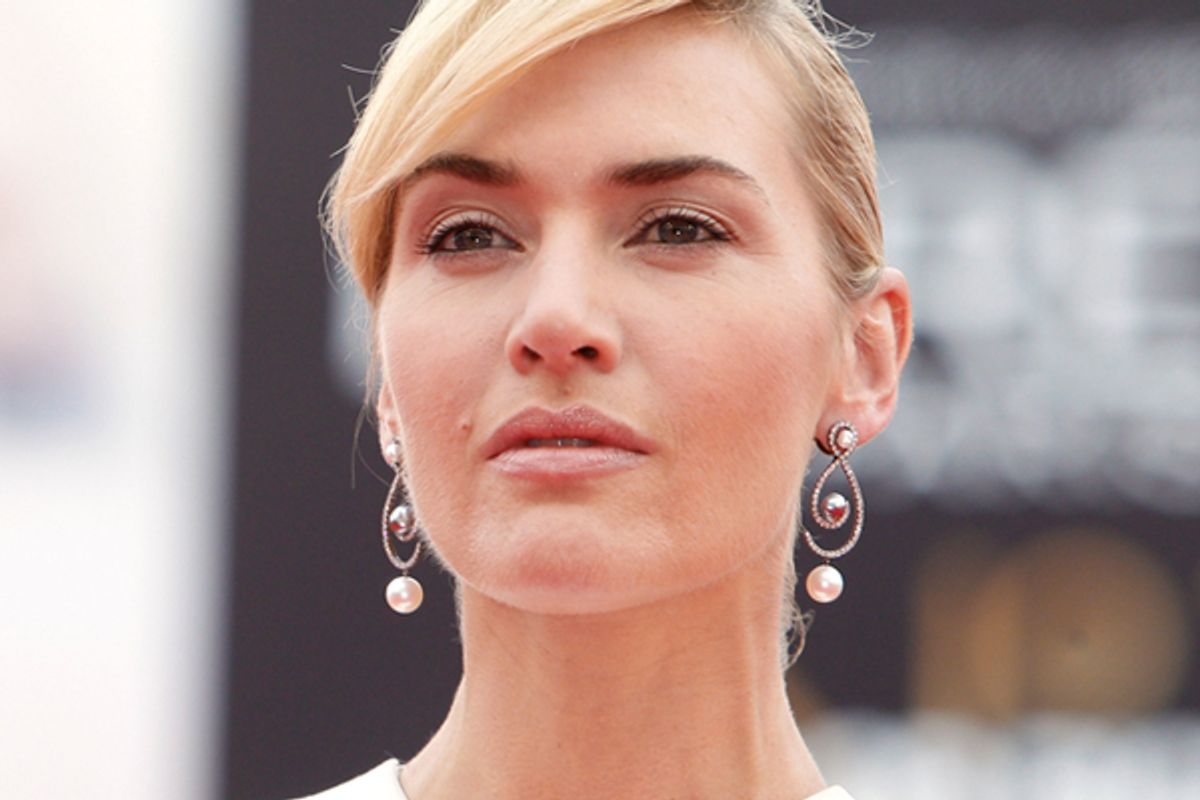"Talk about the best education," says Kate Winslet. Speaking to V magazine this month, the Oscar-winning, eminently glorious actress explained why she likes raising worldly children. In the interview, she relates how her 7-year-old son Joe "turns to me the other day and says, 'One day I will have a girlfriend or a boyfriend, darling. Which would you prefer?' And I said, 'My love, that would be entirely up to you, and it doesn’t make any difference to me.' But that he knows! It’s a real privilege."
It is indeed a privilege to raise a family in an environment that's open and accepting. Joe's also a damn lucky kid to have a mom who makes it clear from an early age that her affection is not contingent upon who he takes to the prom. It's certainly a different tactic than, say, Tracy Morgan's recent promise that his son "better talk to me like a man and not in a gay voice or I’ll pull out a knife" and stab him to death.
That's why Winslet's remarks are a sweet reminder to other parents about the necessity for open and inclusive conversation. Winslet says she loves the "diversity that my children are exposed to every day." But even in the most cosmopolitan environments, from the moment kids are plopped in that toy truck or ballerina-festooned crib, from the day they first watch a cartoon princess kiss a prince, kids grow up in a profoundly pink-and-blue world.
Last year, an educator came to our elementary school to do a workshop with parents on how to talk to our kids about sexuality. Early in the evening, she asked parents to describe what they've already discussed with their kids -- who range in age from 6 through 12 -- about dating, touching, kissing and the whole schmear. Only one parent mentioned anything about same-sex relationships. This, by the way, is a progressive school in New York City, one that has children with gay parents in its student body.
You can understand how merely broaching the notion of homosexuality as something your offspring might one day know about would be anathema in a deeply religious or conservative community. That's how Tennessee managed to pass a law prohibiting discussion of "any sexual behavior other than heterosexuality" in the classroom. As long as nobody talks about it, nobody can get indoctrinated, right?
But even in the liberal, gay-friendly pockets in our godless urban Sodoms, heterocentrism is still the default. It's not necessarily out of any deliberate intention to Protect The Children. The truth is that there are more straight people out there, so the odds are in favor of your kid being straight. The odds don't really matter though, because maybe your kid isn't. Or maybe your kid will someday have same-sex feelings for someone, or experiment sexually. And regardless, your kid absolutely is going to grow up around gay people. Your kid will go to school with them and work with them and be friends with them. So you might as well talk to them in terms beyond boy meets girl.
And when you do, don't be surprised if it blows their minds. My 7- and 11-year-old daughters, who last week were getting compliments on their ponchos from Provincetown drag queens, who live in a state in which two dudes or two ladies can get married any time they want, still see the world in almost entirely hetero terms. They don't just take their own inevitable futures of falling in love with handsome princes for granted-- they shrug off the notion that some of their friends might have a different path. Right now, it's enough for them to grasp that some grownup men like other men and some grownup women like other women, and that Chaz Bono used to be a woman but is now a man and is going to be on "Dancing With the Stars." But they cannot yet envision their future selves in such a world.
Talking to kids about love and sex and identity aren't one-time events. They're ongoing conversations. But how lovely that moms like Kate Winslet understand that, and can see opportunity in the offhand remarks of a little boy. How valuable to remember that while someday your child will be an adult, with loves and heartaches you can't yet predict, he or she will always be your child. And that you can tell him or her just that, today.

Shares